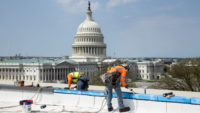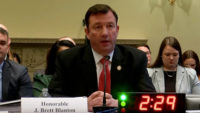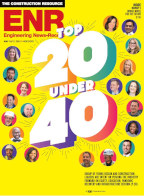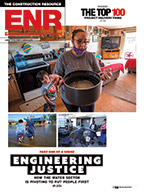Right now, I'm in Cairo, Eqypt, one of the oldest cities in the world. I'm at the IV International Symposium on Environmental Hydrology and the IV Regional Conference on Civil Engineering Technology.
 |
| ASCE President William P. Henry has been traveling to discuss anti-corruption initiatives. |
My reason for being here is to tell everyone about the American Society of Civil Engineers' effort to develop guidelines for professional conduct that will help combat corruption in our industry. It is the hallmark of my term as ASCE president.
Since ASCE started its anti-corruption program last year, I have been traveling across the U.S. and around the globe to discuss this important issue, to listen to others thoughts and opinions, to hear about their experiences and to learn about good ways to curb corruption.
There are two Egyptian dignitaries in attendance: His Excellency Mahmoud Abu Zaid, Minister of Irrigation and Water Resources, a long-time international member of ASCE, and Mohamed J. Abdulrazzah, Director of UNESCO Cairo.
After opening remarks by Abdulrazzah, His Excellency Mahmoud Abu Zaid gave an impassioned presentation on the challenges faced by the world community to address the scarcity of water.
Much work needs to be done to meet basic needs for drinking water and water for agriculture amid a growing world population, with numerous obstacles. Abu Zaid noted that to achieve the World Water Councils vision by 2025, the world needs to invest $180 billion per year for the next ten years in water, and much of this will occur in the developing countries. These staggering figures recognize that public/private partnerships must be encouraged.
When my turn came to speak, I gave a presentation on combating corruption to an audience of 150 Middle Eastern engineers. Fighting corruption has been the focus of my presidential initiative and I have been really pleased with the support we have received from engineering organizations worldwide, including in Asia and South America, where I have also traveled recently.
My remarks triggered a series of interesting questions. The diverse audience, which included many women civil engineers, recognized and agreed that bribery and corruption consume much of the resources that could be used to alleviate many of the worlds problems (over $390 billion is lost each year to bribery and corruption).
How many roads could be built and how much water could be treated if that amount was not lost?
The audience made many suggestions, including how to improve the delivery of the message to the rest of the engineering community worldwide, adding ethical courses in the engineering curricula and establishing strategic policies for professional societies to use. Some also pointed out that circumstances differ from country to country. Acknowledging that reality, I emphasized that ASCE is compiling principles and guidelines applicable to the individual professional society within its own country and culture.
I also stressed each individual engineers responsibility for ethical conduct, especially in developing countries where the engineer holds a greater position of esteem within the society. An engineers leadership in making ethical decisions can better impact the policy makers at the government level.
As far as I'm concerned, we can best eliminate poverty in the world by eliminating corruption.
Next stopPoland.
![]() Links:
Links:
Focus on Engineerin ASCE Guidelines (02/28/2005 )





Post a comment to this article
Report Abusive Comment